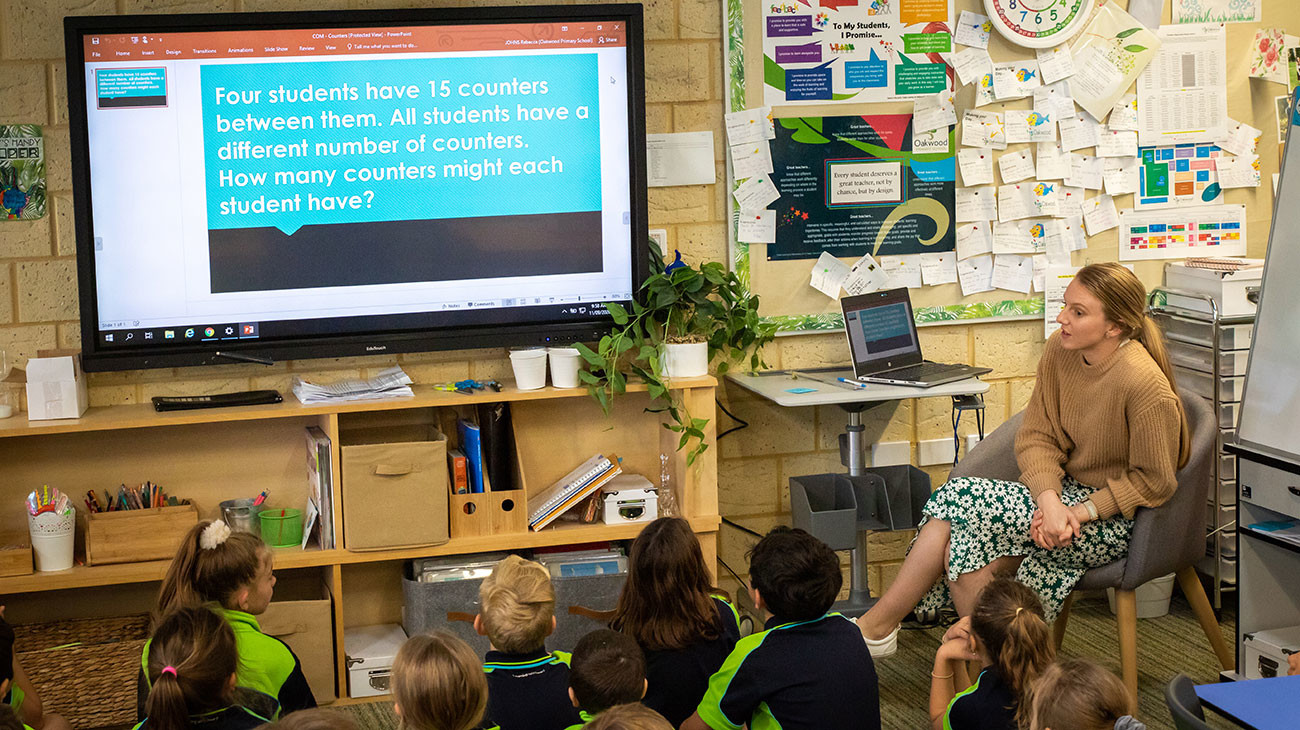Posted Tuesday, 20 May 2025
Scitech to spark science curiosity across the Kimberley
Scitech is embarking on an epic tour across the Kimberley, visiting 26 remote community schools.
‘Talk Moves’ has helped Rebecca and her students have rich discussions that makes the learning visible to everyone.

Hi everyone,
Rebecca Johns, Year 3 teacher at Oakwood Primary School, back with my second blog post. You can read my first one here.
In the Champions of Maths program, questioning and the discussion phase is an important part of the coaching process and workshops. Of the 3 phases, Launch, Explore and Discuss, the ‘Discuss’ phase involves intentional questioning in order to illicit rich discussion from students about their mathematical thinking, in order to make it visible for all.
During the discuss phase the teacher uses intentional talk and targeted questioning to ensure that the best mathematical learning occurs. Throughout the coaching and the workshops, we have focused on ‘Talk Moves’ which refer to the following types of questions: repeating, revoicing, reasoning, adding on, wait time, turn-and-talk, revise, and draw attention.
I believe that this style of questioning has great transference into other areas of teaching as we move away from teaching students in a style that only imparts knowledge into empty vessels. As a teacher, I want to be able to teach students to question, to unpack their understanding and to share their reasoning with their peers. I believe that the Champions of Maths program gives you the tools as a teacher to be able to facilitate that discussion effectively with your students.
The different talk moves that are used throughout the questioning part of the problem-solving activity are very powerful in creating a meaningful discussion. Many of these ‘talk moves’ have become an integral part of my everyday teaching and daily questioning. The simplicity of a turn and talk is a simple but powerful approach to questioning, it allows you to pose a question and gives students time to have rich discussion with their peers.
Example of a lesson sequence and talk moves:
The lesson focus was looking at fractions and more specifically the connection between the fraction of individual or multiple items.
The learning intention: When we divide an object or group into equal parts, we are creating fractions.
Question posed to the students: I need to share 6 chocolate bars equally between 8 friends. How might I do this? Give 2 different options. What fraction of a bar does each friend get? Label your fractions.
The students then engaged in the ‘Explore’ phase coming up with a variety of results:
During the ‘Discussion’ phase these were the planned connecting questions that I used:
Reasoning – why would a strategy be to divide the bars into 8? Is this the most efficient way? Do you agree or disagree?
Turn and talk – how do we know that the part we receive is equal? How do we split something into equal parts?
Turn and talk -When we talk about a whole it can be a single object, a group of things or different things. What is the ‘whole’ for this question? And what part of the whole are we finding?
Revise and draw attention – What does it mean for something to be equal?
Having planned these questions I was able to illicit a rich discussion which helped students make connections and made the learning visible for all.
At my school, we have a strong focus on Inquiry learning through our blended pedagogy, and the ability to create well rounded thought-provoking question is really important for our inquiry teachers. I find that making thinking visible is important in all subjects and can be helpful for students to understand and reason when learning new content. The Champions of Maths program is a great asset for your mathematics teaching and the fact that it can also transfer to other areas of your teaching is an added bonus!
Would you like to continue a discussion on this topic with other educators? Join our Facebook group!
If you are interested in joining the Alcoa Maths Enrichment Program please fill out the enquiry form below and a Scitech representative will be in touch with you.
Upon clicking the "Book Now" or "Buy Gift Card" buttons a new window will open prompting contact information and payment details.